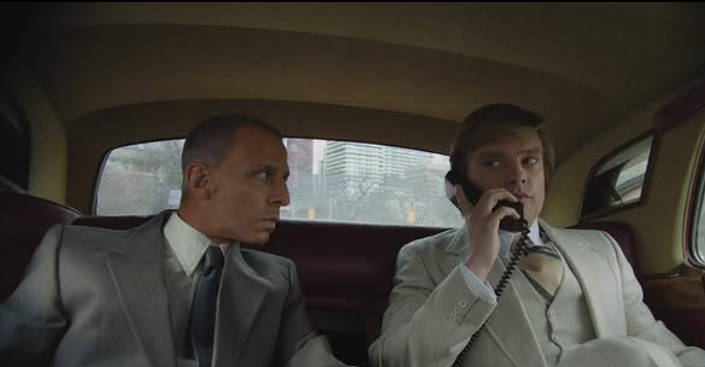
Film Writer Cassandra Fong finds new relevance in 2023’s The Apprentice with the second rise of Donald Trump
Content warning: brief mention of sexual assault
Now that Donald Trump is President of the United States again, The Apprentice makes for an interesting watch. The film opens in 1973, as a young Trump (Sebastian Stan, impressively restrained and pitch-perfect) circles the social clubs of Manhattan, pointing out rich men to impress a date. There, he meets Roy Cohn (Jeremy Strong, terrifying and charismatic), the infamous former McCarthy-era prosecutor turned legal hitman. When Trump complains about a federal discrimination case against his father Fred Trump’s real estate empire, Cohn—never one to waste leverage—offers to “fix it.” What follows is a disturbing act of blackmail, setting the tone for a relationship that will define much of Trump’s early career.
From there, the film traces Trump’s moral descent—or strategic evolution, depending on your view. Cohn becomes Trump’s true father figure, displacing Fred (played with icy detachment by Martin Donovan), and instils in him three guiding rules: always attack, never admit wrongdoing, and always claim victory, even in defeat. These rules echo through Trump’s later political rise—and now, during his second presidency, feel painfully familiar.
Sebastian Stan is impressively restrained and pitch-perfect
Abbasi doesn’t rush. Instead, he lets events unfold with a detached, clinical clarity. We watch as Trump develops the Commodore Hotel into the Grand Hyatt with Cohn’s underhanded help, securing a massive tax break through intimidation and blackmail. We see Trump build Trump Tower, not just as real estate, but as a monument to ego. We watch his relationship with the press shift—from curiosity to symbiosis to manipulation. Abbasi’s approach is subtle, almost forensic, which makes the story land all the harder.
One of the film’s biggest surprises is Maria Bakalova’s portrayal of Ivana Trump. She brings glamour, ambition, and vulnerability to the role, beginning as a Czech model swept into Donald’s orbit and emerging as a sharp businesswoman who co-pilots the Trump Organization. Their marriage is fraught—from Donald’s discomfort with her fame, to a shocking scene of sexual assault when she confronts him about his affairs and demands. Bakalova’s Ivana is not just a tragic figure; she’s also a lens into how Trump’s relationships are always rooted in control, branding, and dominance.
Cohn’s arc is no less tragic
The film is also attentive to the family dynamics that shaped Trump. His older brother Fred Jr.’s descent into alcoholism and eventual death is depicted with quiet, devastating power, and we see how Donald positions himself to take control of the family fortune by exploiting their father’s declining mental state.
Cohn’s arc is no less tragic. Diagnosed with AIDS and abandoned by the world he helped build, he reaches out to Trump for help—only to be met with cold self-interest. One of the most haunting sequences comes when Trump celebrates Cohn’s birthday at Mar-a-Lago and gifts him what appear to be diamond cufflinks—later revealed, by Ivana, to be fakes. It’s emblematic of their relationship: transactional, performative, disposable.
By the end, with Cohn dead and Trump reinventing himself through ghostwriter Tony Schwartz (The Art of the Deal makes a brief, cutting appearance), we see the finishing touches being placed on the brand—Trump—that would one day reshape American politics. He repeats Cohn’s three rules as if they were his own, stares out a window at a billowing American flag, and casually muses about becoming president. In 2025, that moment doesn’t feel absurd—it feels like a spoiler.
Enjoyed this? Read more from Redbrick Film:
Poisoned Apple: Why Disney Should Have Left Snow White Alone

Comments